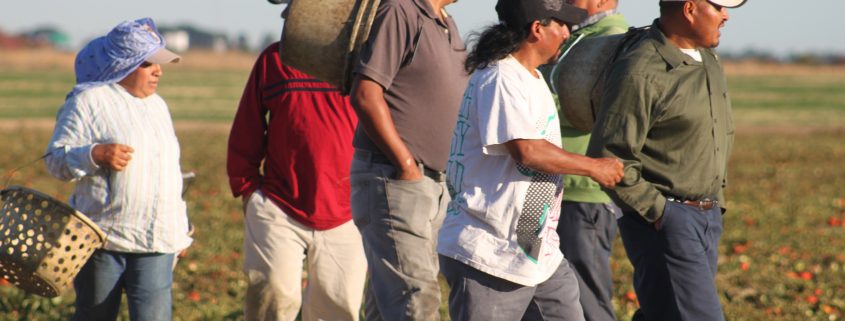Black Hills Special Services Cooperative – Success Story
/in AFOP, Success Stories /by asimiqbl3National Farmworker Jobs Program Participant Highlights
Kirby Peterson, a low-income seasonal hired-hand laborer from Cheyenne-Eagle Butte Sioux Tribe met with the National Farmworker Jobs Program (NFJP)Case Worker to discuss post-secondary education options.Poverty has loomed over this reservation for generations. Repeated attempts to create jobs have run into challenging obstacles including the isolated location; the area’s crumbling infrastructure; and a workforce in desperate need of training to name a few. Kirby wanted better.
Kirby wanted to obtain the skills and training in a career field of interest that were necessary to provide him with a good paying job and benefits. Kirby’s primary source of income had been working in the cattle industry in Eagle Butte. Due to the low unemployment rate and high level of poverty in that area, his pre-program earnings at the time of enrollment were a mere $3,268. This qualified Kirby for NFJP.
Kirby’s career goal was to obtain training in the Radiologic Technology field of study, a high demand job in the state. The NFJP staff worked collaboratively with various agencies such as Native American funding sources, Low Income Energy Assistance and the South Dakota Department of Labor and Regulation’s workforce training program to assist Kirby in reaching his goal. Kirby successfully completed his Associate of Applied Science Radiologic Technology degree at Mitchel Technical Institute in Mitchell, South Dakota. He participated in an internship at the local hospital where he was able to obtain further training. Additionally, he participated in the National Radiology Technology Conference in Orlando, Florida. At the end of April of 2017, he had another opportunity to gain more skills and experience in his field of study when he attended the South Dakota Society of Radiologic Technologists (SDSRT) in Sioux Falls. Kirby is grateful for the opportunities and resources made available to him through NFJP to reach his goal. Kirby is employed full-time at the Cheyenne River Health Center. He is enjoying his new career and looking forward to this new journey in his life. Kirby went from living in poverty earning less than $6,000 per year to earning $46,969!
Jon was a low-income farm worker, native of Corsica, SD. Throughout high school, Jon worked at a farm where he would breed sows and administer shots to the newborn piglets earning $7.25/hour. He graduated from High School in May of 2015. In the fall of 2015, Jon started school at Mitchell Technical Institute with the career goal of obtaining a degree in wind turbine technology. When asked how he came about signing up for the National Farmworker Jobs Program (NFJP), he indicated he saw an informational flyer posted at the school and decided to look further into it. Jon called the number and the case manager visited with him and determined Jon was eligible for the program.
Jon knew once he entered college, he would be financially strapped and was uncertain how he would be able to pay bills and stay in school. Signing up for the NFJP program helped Jon financially and in turn,be successful in school. Jon stated,“it was a stress reliever and it helped me focus more on my school work and grades.”
NFJP provided Jon with financial support for gas, rent, groceries, and student stipends.This assistance was a significant contributing factor in helping Jon reach his goal, graduating with high honors. Jon is now currently working at MA Mortenson Company,a wind blade repair company, earning $20 per hour and working 10 to 12 hours a day.
Jon’s five year goal is to go back to school for his bachelor’s degree in sustainable management. He wishes to one day run his own construction business and possibly own his own hog farm as well.
Arkansas Human Development Corporation – Success Story
/in AFOP, Success Stories /by asimiqbl3Oscar Ferretiz is truly a success story. He was working for Rancho Jose in Foreman Arkansas making $250.00 dollars per week, feeding chickens and repairing fences. Oscar Ferretiz pick up a flyer from Cossatot Community College of the University of Arkansas that described the National Farmworker Jobs Program (NFJP) and thought he might be eligible. Oscar contacted Arkansas Human Development Corporation (AHDC’s) Office in Hope, Arkansas, where he met AHDC Employment Specialist Maria Ramirez. Oscar’s goal was to earn a commercial driver’s license (CDL) and become a Truck Driver. After completing his application and enrolling him into the NFJP and hearing about his goals, Maria Ramirez arranged for AHDC to pay for his tuition and fees for CDL training at Cossatot Community College of the University of Arkansas in Nashville, Arkansas. According to his needs assessment, he lacked transferrable work skills and was challenged by math. He started training August 7, 2017 and completed training August 31, 2017. On September 11, 2017 Oscar Ferretiz landed employment with Buster Roberts Logging, Inc.in Dierks Arkansas. Oscar began making $15.00 an hour with benefits and working at least 40 hour per week. He is earning significantly more than what he was earning on the farm. Oscar stated, “If it wasn’t for Arkansas Human Development Corporation, I would not have been able to provide a better life for my family. AHDC helped me succeed and was with me every step. Thanks to AHDC I accomplished a lifelong goal.”
From the Desk of the Executive Director
/in AFOP, From the Executive Director's Desk, Newsroom /by asimiqbl3From the Desk of the Executive Director
/in AFOP, From the Executive Director's Desk /by asimiqbl3Hello, and welcome to the September 2017 edition of the Association of Farmworker Opportunity Programs newsletter “Washington Newsline.”
I first want to congratulate the AFOP members and their staffs for attending the AFOP national conference this month in Las Vegas, Nevada. This year’s conference program is chock full of important information and effectiveness-enhancing trainings that will allow AFOP’s high-flying members and staffs to continue to deliver one of the, if not the, best job-training programs at the United States Department of Labor: the National Farmworker Jobs Program. Through their NFJP work, they changes lives for the better, help our local communities become stronger, and deliver on the nation’s commitment to our farmworkers. My hat’s off to all of you!
Despite NFJP grantees’ year-upon-year excellent performances, the new administration recommended in its fiscal year 2018 budget proposal in May no funding for the program. Recognizing the continuing success of and need for NFJP, appropriators in the House, struggling with a very tight allocation, were able to fund the program in their bill at $72 million, an 11-percent cut from the recently enacted current level of $82 million. At that time, House Labor-HHS-Education Chairman Tom Cole (R-Oklahoma) said he hoped he would have additional resources later this year to increase investments in worthy programs, like NFJP. Happily, Senate appropriators improved upon the House number, increasing it in their legislation to $82 million in level funding.
Attention now turns to eventual House-Senate negotiations that will resolve the differences between each chamber’s spending measures. With the September 30 fiscal year-end quickly approaching, Congress recently passed a continuing resolution to keep the federal government funded at current levels starting October 1. That resolution – or “CR” – will last until the middle of December. At that time, negotiators will either need to strike a deal over fiscal year 2018 spending, or move another CR of some unknown length. In this period, with luck, Congress will agree to a separate deal to raise the budget caps, making it easier for lawmakers to provide quality programs, like NFJP, the funding levels they deserve.
In closing, AFOP wants to extend its best wishes to all who are suffering from the damage wrought by the recent hurricanes. AFOP is working closely with the Labor Department’s Employment Training Administration to coordinate any potential emergency relief for farmworkers. While early indications are that things on the ground may not be as bad as initially feared, we will continue our partnership with ETA officials to ensure the necessary and proper level of response.
Home ∗ About ∗ Members ∗ Events ∗ H&S Programs ∗ CIF Campaign ∗ Contact
“AFOP does not discriminate on the basis of race, color, national origin, or handicap.”
© Association of Farmworker Opportunity Programs










